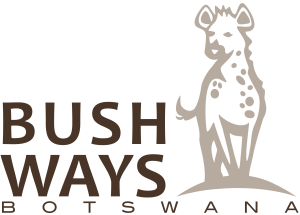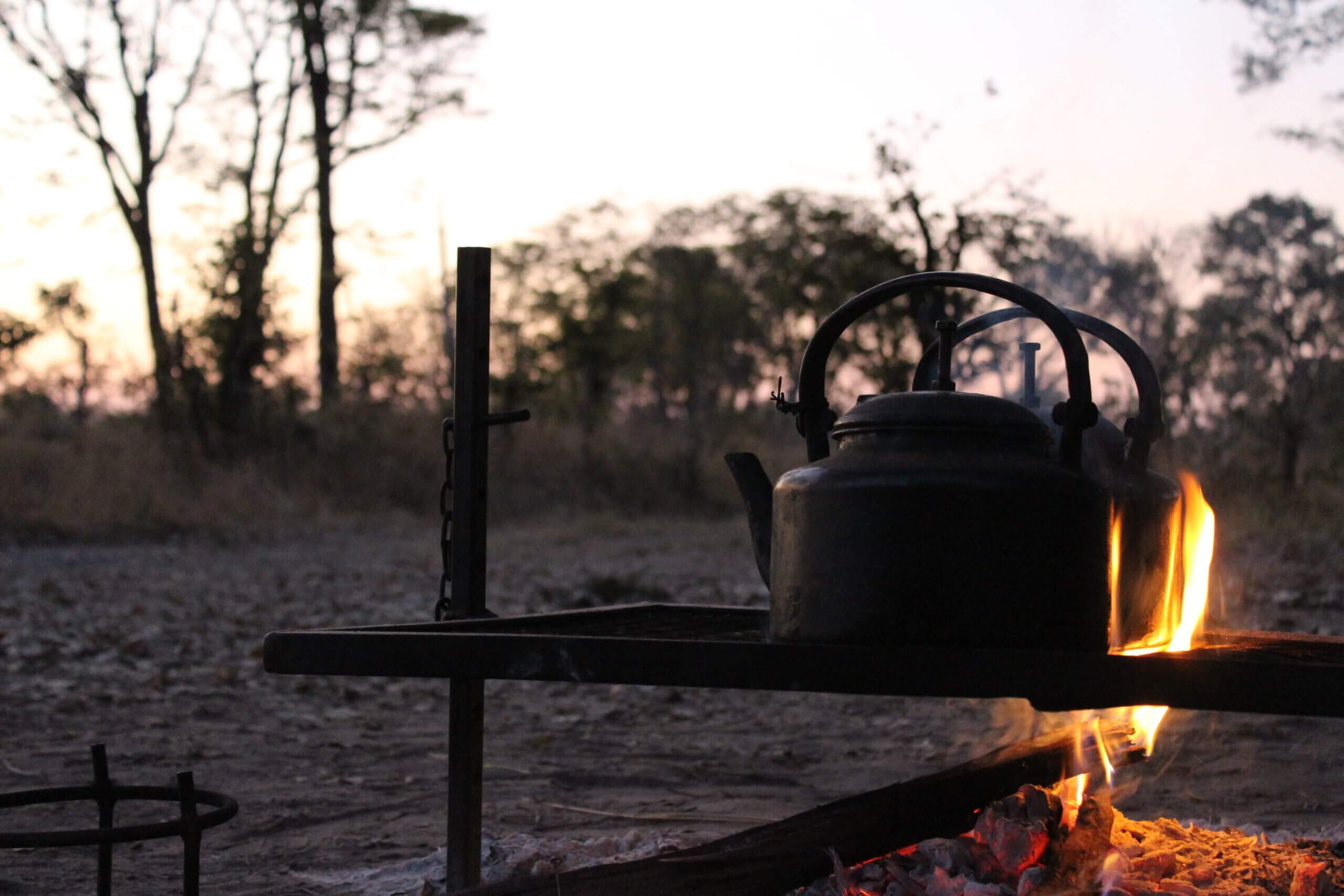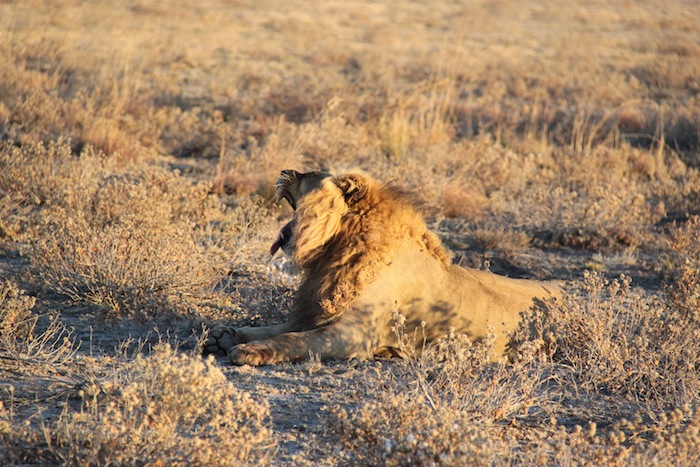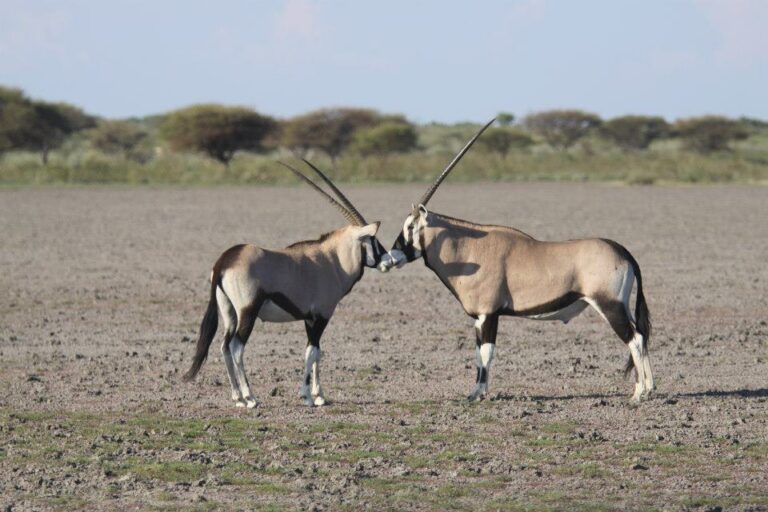Botswana’s cuisine is considered to be rather practical. It needs to provide high protein and a lot of energy to keep one satisfied for a long period of time and it needs to give you everything to be prepared for the harsh African environment. The different traditional dishes are not difficult to cook and they do not need a long time to prepare, due to the fact that large numbers of people, such as big families or even whole communities have to be fed. The main source for protein is beef and milk. Cattle farms can be found all over Botswana, which is also a very important economic sector. A high percentage of beef is exported and the quality of the meat is up to European standards. Besides beef you will find lots of chicken, goat, fresh water fish and even game meat such as warthog in the traditional Botswana dishes.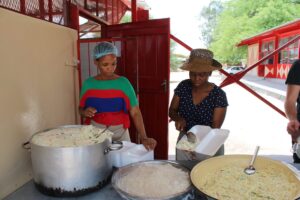
One of the traditional Motswana dishes is Seswaa, a heavily salted mashed-up beef or chicken meat stew served over pap (similar to polenta). Pap is maize flour mash, it doesn’t have a strong flavor, but is high in energy and it definitely fills the stomach. Another very common way to prepare food is having a braai. This derives from the South African influence and basically means to have a BBQ. Very often you will find a traditional “boerewors” on the braai – a beef meat sausage with a tasty flavor. A very tasty alternative, are whole chickens in a marinade which come out really nicely on a braai. All other kinds of meat can also be added, depending on your preferences. A very extraordinary dish is the Mopani worm. This worm gets harvested in the Southern hemisphere summer months (November – April) and is a type of caterpillar. The locals cook, boil, dry or fry it – try it if you come across a fried Mopani worm, it tastes better than one would think.
For breakfast you commonly find maize or sorghum porridge in Botswana. Porridge can be combined with any fruit or flavored yoghurt and should not be left off the breakfast table. Typical fruits are apples, mangoes, watermelons, bananas, just to name a few. Although a lot of vegetables are grown locally, such as carrots, beans, (sweet) potatoes, lettuce, onions, you will not find them often in the local people’s dishes. Mainly the locals prepare mashed pumpkin, beetroot salad or coleslaw which accompanies their stew.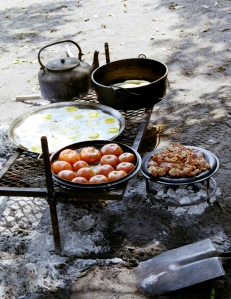 During your safari you will enjoy a wide variety of meals and we attempt to include an ‘African’ flavor in all our safari menus. We will also provide some of the Botswana traditional dishes. All the meals will be prepared over an open fire. Your Camp Chef will take care of all the cooking but you are more than welcome to learn firsthand about the real Bush Cuisine. You will be surprised what tasty creations the Camp Chef can make over the camp fire – from first class cooked meat to wonderful vegetable creations and even baked bread and cakes! It is truly amazing how they make use of the fire and spoil you with perfectly rounded dishes!
During your safari you will enjoy a wide variety of meals and we attempt to include an ‘African’ flavor in all our safari menus. We will also provide some of the Botswana traditional dishes. All the meals will be prepared over an open fire. Your Camp Chef will take care of all the cooking but you are more than welcome to learn firsthand about the real Bush Cuisine. You will be surprised what tasty creations the Camp Chef can make over the camp fire – from first class cooked meat to wonderful vegetable creations and even baked bread and cakes! It is truly amazing how they make use of the fire and spoil you with perfectly rounded dishes!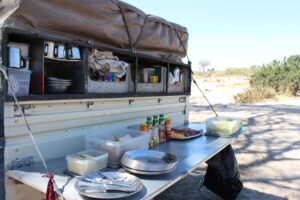
We are happy to cater for specific dietary requirements, provided we are notified in. Please note that specialist dietary foods are not always freely available so advanced notice when booking is essential. It is also important to advise us if you have any allergies or intolerances prior to coming on safari so we can plan for and accommodate your dietary requirements accordingly.
All food for our safaris is pre-ordered and supplied from either our Maun or Kasane base which means there is a high level of quality as well as minimising any time wasted if your guide had to visit the supermarket. For our fresh vegetables we make use of our own eco-friendly farm just outside of Maun.
We hope you enjoy your stay here in Botswana and you will experience the real African flavor. Don’t be shy and ask your Guide and Camp Chef about their favored dish – you will be surprised what exquisite dishes they prefer!
Itumelele Dijo Tsagago!
